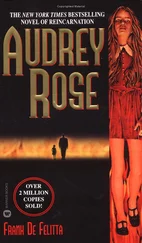“Not necessary,” he said, his eyes twinkling ironically. “Good-bye, Mrs. Templeton. Come whenever you like.”
She left, buoyed up by the Master’s gentle but irresistible optimism. She did not even mind the slips on her desk, saying that Bill had called twice. She did not even mind his displeasure at the Master’s vague answer to the question of time.
But gradually, as the climate turned colder, and the leaves clustered at the base of the buildings, and the rain began to break with fury over the cold stone, Bill’s attitude began to weigh down on her. He called five times, six times a day. He called at home. He needed magazines; some had to be ordered from London or Delhi, and he needed them now. And she had to disguise them as Newsweek s and Time s to keep Dr. Geddes in the dark.
Janice went to the Temple five more times, until she felt she was studying for some cosmic final examination. Like a robot, she wandered for the thousandth time into the religion sector of the public library, looking into obscure journals with unreadable print. She felt like a marionette, with Bill jerking the strings with unforgiving violence, impatient and angry.
And yet the search, at some subliminal level, was having its effect on her. She knew too much. She refused to believe, and yet she was no longer simply a go-between. The concepts traveled around with her, a perpetual resonance from another world.
She slept alone at Des Artistes, the nights a heavy weight to endure. She neither feared the night nor yet looked forward to the dawn. Sleepless, driven by Bill, she went to work only half conscious of the exhaustion that was sapping her will to resist.
Bill called, excited. He was making discoveries, he claimed. Now he needed to know the specifics of signs.
“Signs?” Janice asked.
“Yes, the signs of reincarnation!”
“Bill, I’m exhausted. I can’t do this much longer.”
“Just a few more questions, honey. A few more answers. Then we’ll be all set.”
“Set for what, Bill?”
“Never you mind. Just get to the old geezer and pop him these questions.”
Janice wearily watched her hand write down more questions on the note pad. She avoided Elaine as she sneaked out for what seemed like the hundredth time at 3:30, and headed down to the Temple.
“So, Bill sends you back again,” the Master said.
“Yes, it’s — it’s the signs he wants to know about,” Janice said, entering onto the slanted wooden floor. “It seemed very urgent to him.”
The master closed the door behind them.
“Signs?” he asked, his eyes twinkling as they always did; but somehow they never denoted humor, only a steady, ice-cool concentration that was almost lyrical in its purity.
He turned, ushered her into his cold office. He lit a small stove with newspapers, shoved in sticks — the table legs of cast-off furniture — and rubbed his hands, blowing on them. Setting a battered tin pot on the stove, he went to a small basin, turned the tap for water, and made preparations for tea.
“The signs of reincarnation,” Janice said fearfully.
The Master nodded slowly, as though he had heard the question, urgently demanded, a hundred, a thousand times before, but did not answer at once.
Janice thought he was merely waiting for the tea water to boil. It was his custom to begin indirectly, to make oblique references to the matter at hand to induce serenity. That was why words made perfect sense here, and didn’t quite when she relayed them to Bill.
“Things have changed so much,” he said softly.
“What do you mean?”
“When I came here, there were a thousand young people clamoring at our door. And such enthusiasm. Reading and chatting and real, sincere worship. And now we are down to five students.”
Janice nodded awkwardly, surprised at the realistic attitude the Master displayed.
“Fashions change,” she said softly.
“Yes. Fashions. But when I came from India ten years ago, it was no fashion. At least, it seemed to be real. But now we are no longer respected.”
Unaccustomed to his downcast mood, Janice said nothing. She watched him walk to the stove where he fed more paper and sticks into the stove. He stood over the water, pushing back the long, orange sleeves of his robe. Now, in the soft, Vermeer light of the shabby office, he looked indeed no older than fifty, handsome in a masculine, Western way, the white hair a subtle shock over the brown skin.
“This may be the last time the Temple will be open to you,” he said.
“What? Why? Have I done something wrong?”
He smiled sadly. “Of course not. But the rent here, Mrs. Templeton. Do you have any idea what it costs to be in Greenwich Village? And now, with almost nobody left, our revenues…”
“I’m sorry, Sri Parutha. I didn’t realize it was that bad.”
The water boiled. Using an aged towel, the Master cautiously lifted the pot and with deft, long-practiced motions, filled two delicate ceramic cups.
“We will be talking about it this afternoon,” he said. “I think we shall disband the Temple.”
“I don’t know how to express my sympathy,” Janice said. “I feel very bad for you.”
The Master smiled again, an enigmatic expression in his eyes. He handed Janice a cup of tea. The aroma twirled upward with the steam; a jasmine scent that, like the gentle light coming in from the frosted windows, obscured all terror, soothed all doubt, and brought a subtle tranquility down to the marrow of the bones.
“There is a phrase by one of the English poets,” the Master said. “The ‘inconstant lover.’ Let us just say that the Americans are inconstant lovers.”
Janice drank slowly, waiting for the brew to cool. She knew the Master had not forgotten why she had come, but she also knew that the realities of what he called the external world had inexplicably intruded and even destroyed his beloved sanctuary.
“Well, then, your husband needs to know the signs of reincarnation?”
The Master removed several books, fat with bookmarkers in them, and several broken brass candleholders. They sat down.
“Basically, the signs can be categorized according to the physical, the psychological, or the religious. Physical signs include birthmarks, wounds — which can reappear in modified forms — or certain congenital abnormalities. A clubfoot, for example, is repeated. Or a claw hand comes back as unexplained scars on a healthy hand. These are really so common that nobody in India would be particularly astonished if you showed up with, let us say, a dead uncle’s deformity of toes, or his laughter, or his manner of expression. Is all this clear, Mrs. Templeton?”
“Perfectly,” she answered, writing quickly onto a spiral-bound notebook.
“Psychologically, if a child has peculiar memories of a place, of people, of events that he or she has never seen. If suddenly, his mood and behavior change, with no warning but in a consistent manner. Like your own daughter, Mrs. Templeton.”
“Yes.”
“Quite often a person feels a sudden desire to travel to a part of the world he has never been to before. And when he goes, he finds that he knows how to get around, he never gets lost, and he knows the names of people he meets. Quite often there is an aspect of violence involved.”
“Violence?”
“Yes. For example, a man is compelled to travel into Madras, and there, not knowing why, he is compelled to wield an axe and he murders a distantly related uncle. It is because, several generations before, he was robbed of his inheritance by the previous incarnation of that uncle. In fact, I know of several cases in which the accused were exonerated on just such grounds.”
Janice nodded quickly, trying to cram her handwriting into the narrow-ruled pages.
Читать дальше












